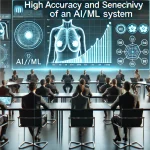RSNA 2020 Abstract
Submission Type: Scientific Presentations
Contact: Vimal Raj MBBS
Institution:
E-Mail: drvimalraj@gmail.com
Primary Category: Breast Imaging
Secondary Category: Artificial Intelligence, Machine Learning, and CAD
Title: Performance of Indigenously Built Artificial Intelligence/Machine Learning Algorithm in Reporting Mammography: Experience From a Developing Country
Authors:
- R Ananyhasivan, FRCR, DMRD, Bangalore, Karnataka, India
- K V Garg, MBBS
- P G Patil, MD, MBBS
- S B C, DMRD, MBBS
- H Prabhakaran
- V Raj, MBBS (gc@chs.world)
Purpose: Healthcare systems in developing countries are heterogeneous in their capabilities and delivery structure. Artificial Intelligence (AI)/Machine Learning (ML) systems from developed countries are often very expensive and not adaptable to local practices. Breast cancer screening programs are not well established in developing countries with significant variation in the competency of radiologists in interpreting mammography studies. In this study, we assess the performance of an indigenously built AI/ML application in reporting mammography studies in a developing country.
Method and Materials: Mammography images from a tertiary referral center and a teleradiology unit catering to numerous institutes were collated between Jan 2019 to Feb 2020. Both CR and DR mammography images were available. Images were divided into training and testing datasets, and the training dataset was annotated by a team of senior radiologists. The AI/ML system was trained to highlight any abnormal finding (both benign and malignant). Cases from the testing dataset were reported by four radiologists and assessed against the AI/ML generated report. Any discrepancy between radiologist and AI report was then reported by a panel of senior radiologists and consensus opinion was generated.
Results: A total of 18,908 examinations were included. The training set consisted of 9,960 studies (53%). Of the testing set, randomly selected 3,042 (23% were CR) cases were reported by 4 radiologists. The accuracy of the AI/ML system was 95% in differentiating normal from abnormal studies. The sensitivity was 98% and specificity was 94%. The most common false positive finding was that of a benign-appearing axillary lymph node (58 studies). Common false negative findings included micro-calcification (9), dense tissue (7), and the presence of multiple lesions (6), wherein some were picked and some were not highlighted. There was no significant difference between the performance of AI/ML on CR or DR datasets.
Conclusion: The indigenously built AI/ML algorithm has promising results with high sensitivity and specificity in a large dataset.
Clinical Relevance/Application: AI/ML mammography reporting performance may vary from one geography to another due to differences in disease patterns or technology. An indigenously built AI/ML system in a developing country can perform well and could offer the best solution in view of costs and the heterogeneous nature of the healthcare system.
Disclosures:
- Nothing to disclose: Rupa Ananyhasivan
- Research Consultant, CHS WORLD: Kushagra Garg
- Nothing to disclose: Pooja Patil
- Nothing to disclose: Sanjana B C
- Developer, CHS: Hari Haran Prabhakaran
- Nothing to disclose: Vimal Raj
Questions:
- Published Email:
- Do you wish to have an email address published in the RSNA program? No
- If yes, please provide one email address: gc@chs.world
- Disclosure of “Off-Label” usage:
- The RSNA recognizes the authors may discuss the application of devices, materials, or pharmaceuticals that are not FDA approved for the discussed application. In keeping with the highest standards of professional integrity and ethics, the RSNA requires full disclosure of the discussion of the unlabeled use of a medical device, product, or pharmaceutical that has not been approved by FDA. Please mark the appropriate response below as to whether you or any of your co-authors will or will not describe the investigational or “Off-label” use of a medical device, product, or pharmaceutical that is classified by the FDA as investigational for the intended use. If you or any of your co-authors will discuss or describe investigational or unlabeled products, the presenting author is responsible for disclosing the information to the audience.
- Yes, discussion will include off-label uses
- Previously Presented/Published:
- The RSNA requires that all abstracts submitted for scientific presentation be original work, not previously presented at other national or international radiological society meetings and not previously submitted for publication prior to the abstract submission deadline date. An abstract that includes an increased number of cases with a new analysis of the data and additionally demonstrates a significant change in results is considered new research; therefore, such work is eligible for consideration. If an abstract merely reflects an increase in the number of cases with no significant difference in the results, it will not be considered.
- Has this work been previously presented or published? No
- Format Preference:
- Accepted scientific presentation abstracts will be scheduled in the following formats at the discretion of the subspecialty chair. While consideration will be given to your indicated preference, decisions on format assignment will be based on the needs of the program. All decisions are final.
- Please indicate your format preference for a paper or poster presentation below: Electronic poster in slide-show (pptx) format
- Trainee Research Prize:
- If you are interested in the Research or Medical Student award, the principal investigator and presenter must be the same. Non-imaging trainees are eligible if they are mentored by a member of the RSNA, AAPM, or ASTRO. If accepted for presentation, the author will receive a letter of invitation to submit a more detailed abstract for consideration of the Trainee Research Prize. Please check below: Not Applicable
- Does the science to which this abstract refers use Machine Learning/Deep Learning technology?
- Yes




